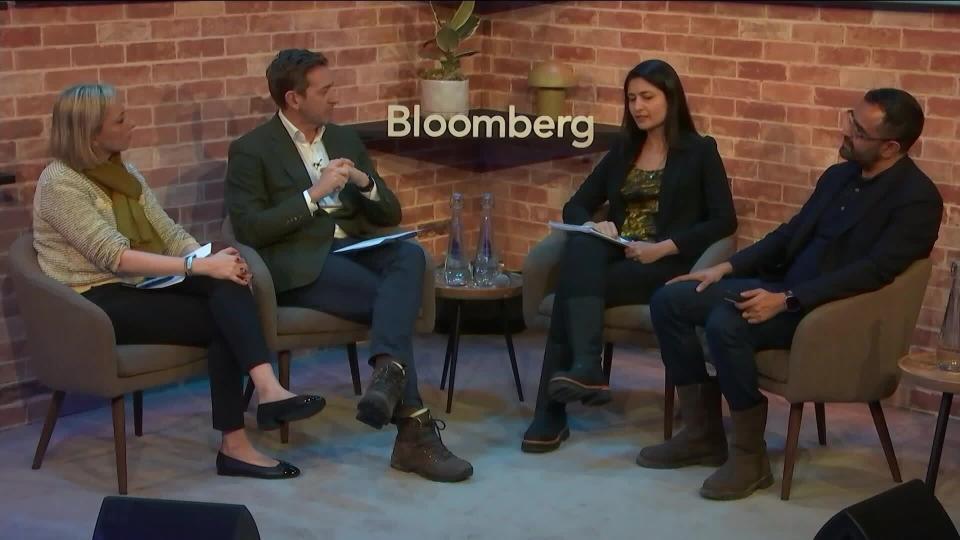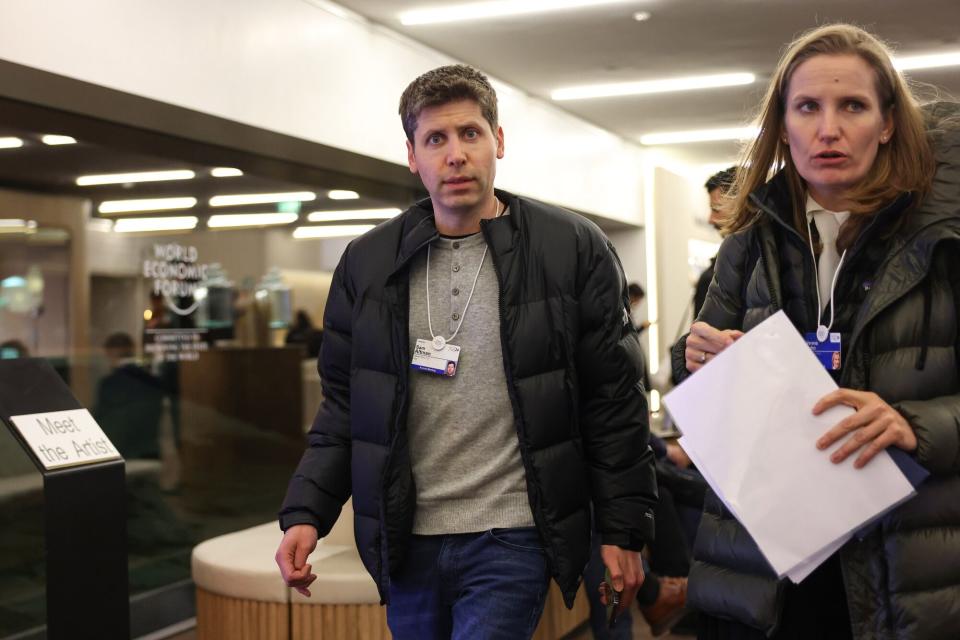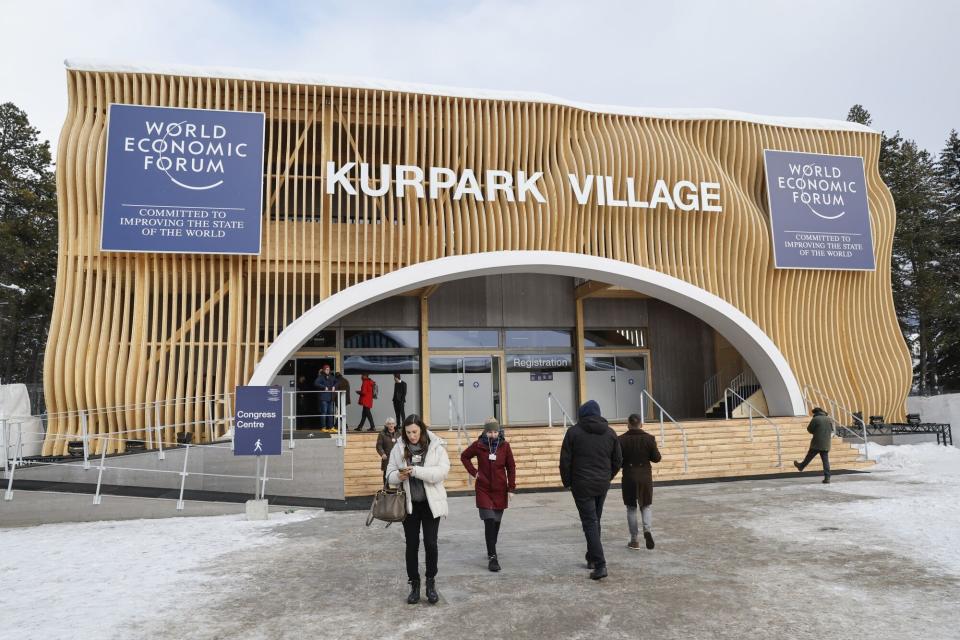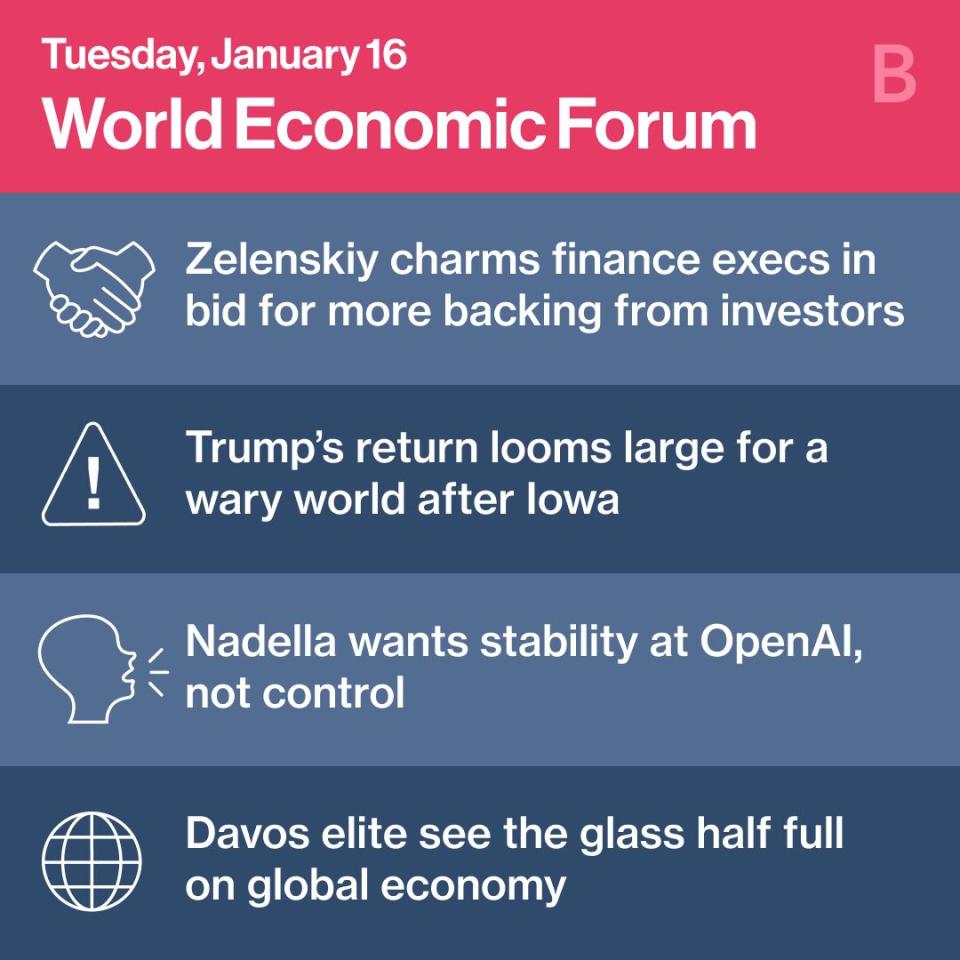Davos Live: Altman Serene on US Vote After Trump’s Iowa Triumph
- Oops!Something went wrong.Please try again later.
- Oops!Something went wrong.Please try again later.
(Bloomberg) -- Sam Altman delivered an upbeat message about the US election as the technology being developed by his OpenAI company and Donald Trump’s resounding victory in the Iowa caucuses dominated discussions on day two of the World Economic Forum in Davos.
Most Read from Bloomberg
Musk Pressures Tesla’s Board for Another Massive Stock Award
What Is Disease X? How Scientists Are Preparing for the Next Pandemic
Stock Selloff Deepens as Traders Adjust Rate Bets: Markets Wrap
“I believe that America’s going to be fine no matter what happens in this election,” Altman said in an interview Tuesday at Bloomberg House. Ukrainian President Volodymyr Zelenskiy earlier made a typically passionate speech, telling delegates in the Swiss Alpine resort that this year must be decisive in the war waged on his nation by Russia and lashing out at Vladimir Putin.
Bloomberg’s team of reporters is bringing you the highlights of what’s happening on the ground. You can sign up for our daily newsletter here. And if you’re in Davos, don’t forget to drop by Bloomberg House. Register here.
(Times CET)
Talk of the Town
Zelenskiy’s Appeal (3 p.m.)
Speaking to a rapt audience, including German Vice Chancellor Robert Habeck, and dressed in his customary dark sweatshirt with Ukraine’s national emblem embroidered on the chest, Zelenskiy carefully read a prepared speech in English in his unmistakable guttural drawl.
Read More: Zelenskiy Targets ‘Predator’ Putin in Davos Pitch for Kyiv Aid
“Putin must regret” the invasion, he said, calling him a “predator” who would not accept a frozen conflict. “We need to finally dispel the notion that global unity is weaker than one man’s hatred – and we can do it.”
Unprecedented Global Risk (12:10 p.m.)
Elsewhere, some participants talked up signs of economic resilience, even as European Commission President Ursula von der Leyen warned that the world is facing the biggest threat to its stability since World War II.
Von der Leyen said that Europe learned a key lesson from the energy crisis triggered by Russia’s invasion of Ukraine and needed to adjust to “an era of conflict and confrontation.”
“Over-reliance on one company, one country, one trade route comes with risks,” head of the EU’s executive arm said. “There is no doubt that we face the greatest risk to the global order in the postwar era,” she said, adding there are “multiple inflection points.”
Von der Leyen met with Swiss President Viola Amherd on the sidelines. On the agenda: Switzerland’s fraught relations with the EU. The Swiss leader also had talks with Zelenskiy and China’s Li Qiang.
Zelenskiy’s Roadshow (11 a.m.)
As he seeks to maintain the flow of aid to the government in Kyiv, Zelenskiy met with some of the biggest names in global finance, including Blackstone’s Steve Schwarzman and Bridgewater founder Ray Dalio, and was greeted in heartfelt terms by JPMorgan’s Jamie Dimon.
Zelenskiy’s mission is to replenish state coffers and divert attention back to the conflict. If Trump returns to the White House, he is expected to depart from the Biden administration’s supportive stance. That could throw a wrench in already stalled plans to keep aid flowing.
China’s Big Entourage (10:45 a.m.)
The entourage escorting Chinese Premier Li has a strong presence at Davos — an attempt to woo global investors as the world’s No. 2 economy struggles with a property crisis and weak sentiment.
Read More: China’s GDP Grew Around 5.2% in 2023, Premier Li Says at Davos
In a keynote speech, Li reiterated pledges to improve the environment for foreign firms in China. His official delegation is said to have at least 150 members and another 100 or so from the Chinese business community.
By contrast, the most senior US officials are Secretary of State Antony Blinken and National Security Adviser Jake Sullivan, representing Washington in discussions largely expected focus on the war in Ukraine and the conflict in Gaza.
In Case You Missed It
Confidence in the resilience of the global economy is cheering up the Davos crowd against a backdrop of war and prospective political upheaval in the year ahead
Back in 2016, Trump’s election stunned US allies and rivals alike. This time, leaders aren’t taking any chances.
What could possibly go wrong with the global economy in 2024? After years marked by war, pandemic and bank collapse, it hardly needs saying: a lot.
Market expectations for rapid interest-rate cuts are a bit premature because the battle against inflation isn’t yet over, International Monetary Fund official Gita Gopinath said.
Tech Buzz
OpenAI ‘Soap Opera’ (5:45 p.m.)
Altman said he’d rather focus on how AI will shape the future of humanity than the still poorly explained power struggle that saw him briefly kicked out of the company he helped found, asking: “Is really what you want to spend our time on is the soap opera rather than what AI is going to do?”
Read More: OpenAI Says It’s Working With Pentagon on Cybersecurity Tools
After a staff revolt following his November ouster, Altman returned to OpenAI, which then overhauled its board. The company replaced all but one of its directors and granted a nonvoting observer seat to Microsoft Corp., its largest investor.
Cyber Conflict (4 p.m.)
Check Point CTO Dorit Dor told us on the sidelines of the forum that the Iran-backed Hezbollah militant group in Lebanon and Russia-linked hackers have stepped up cyberattacks against Israel since the war with Hamas began in October.
Read More: Hezbollah Steps Up Cyberattacks on Israel, Check Point CTO Says
Israeli targets have seen a 20% increase in attacks, with the figures rising to 50% for defense-linked companies, according to Dor.
The AI Age (1:15 p.m.)
Retired tech billionaire Bill Gates says the technology is the biggest productivity advance in our lifetime. “It is so dramatic how it improves white-collar productivity,” Gates said during a discussion at Bloomberg House.
Accenture CEO Julie Sweet seems to agree. Her company has 150 people signed up to do workshops on artificial intelligence rather than attend panels. “There isn’t an area, there’s not an industry that’s not going to be impacted.”
No Profit, No Problem (10:15 a.m.)
Microsoft CEO Satya Nadella said he wants good governance at OpenAI, but he’s not worried about the company’s nonprofit structure and doesn’t want greater control over his partner. “What we just want is good stability,” he said in an interview at Bloomberg House. “So I’m comfortable. I have no issues with any structure.”
Read More: Microsoft’s Nadella Wants Stability at OpenAI, Not More Control
Nadella also said his company, which received a non-voting board observer role at OpenAI following Altman’s surprise ouster and rapid return in November, doesn’t desire an actual seat on the AI research company’s board.
Insider’s Guide
Ukrainian Roast (11:45 a.m.)
While Zelenskiy is meeting executives and leaders, a few miles down the road Ukraine House is drawing policymakers, businesspeople — and coffee lovers.
A group of four baristas working for Svit Kavy, a roastery from Lviv, embarked on a three-day road trip to the Swiss mountains from Western Ukraine, loading their car with coffee beans and setting off to warm the Davos crowd with cappuccinos and flat whites.
The members of the team, who want their presence here to show that Ukrainian businesses are operating uninterrupted, are no strangers to supporting Ukraine’s war effort, having provided coffee to frontline soldiers since the 2014 invasion of Crimea.
Disability Access (10 a.m.)
The WEF has been hosting panels and launching projects on disability representation for many years, but can more to improve its own accessibility.
Despite warnings about icy weather conditions, most sidewalks and crosswalks are not properly deiced and some still don’t have lowered curbs or flat access.
Badge Palette (8:45 a.m.)
A coveted spot at the WEF isn’t enough to signal status in global business and politics. The event has its own hierarchy, and it’s all about the badge color.
The most important attendees get white badges with a hologram, giving them access to all areas, including ultra-exclusive back rooms. Those badges are reserved for the V-VIPs: think heads of state, CEOs or very top media executives.
Official delegates will have a plain white badge, while members of their entourage get green ones. Orange badges are reserved for journalists, and purple badges are given to the technical teams. Blue badges, meanwhile, are worn by WEF staff.
--With assistance from Viktoria Dendrinou, Jessica Loudis, Sabah Meddings, Alessandro Speciale, Jenny Surane, Cagan Koc, Akshat Rathi, Jing Li, Jorge Valero, John Follain, Aliaksandr Kudrytski, Daryna Krasnolutska, Chiara Albanese, Sarah Muller, Brad Stone, Jake Rudnitsky, Natalia Drozdiak and Zoe Schneeweiss.
Most Read from Bloomberg Businessweek
Japan’s Market Roars Back to Life—With Old-Timers Leading the Way
Patti LaBelle Moves From Stage to Stove With a Recipe for Success
©2024 Bloomberg L.P.





